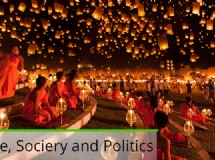South African politician and anti-Apartheid activist. Helen Suzman spent 13 years as the lone parliamentary opposition to the Apartheid government.
Date of birth: 7 November 1917, Germiston, Transvaal, South Africa
Date of death: 1 January 2009, Johannesburg, South Africa.
An Early Life
Helen Gavronsky was born on 7 November 1917 in Germiston, Transvaal, to Lithuanian Jewish immigrant parents, Samuel and Frieda.
Her mother died just two weeks after giving birth and her father later remarried. She matriculated from Parktown Convent in 1933 -- no other local school would accept a Jewish girl as a student at that time -- and went straight to the University of Witwatersrand to study for a Bachelor of Commerce degree. Her degree studies were interrupted when she decided to take time out to travel to Europe.
Returning to South Africa, Helen met and fell in love with Dr Moses Meyer Suzman. At the age of 19 (in 1937) Helen married Dr Suzman, and they settled in Johannesburg. (Dr Moses Suzman went on to become one of South Africa's leading physicians.) Following the birth of her first child in 1941, Helen Suzman returned to the University of Witwatersrand and completed her degree.
A Political Awakening
From the end of 1941, until 1944, Helen Suzman worked as a statistician for South Africa's War Supplies Board. In 1945 she returned to the University of Witwatersrand to take up a post as lecturer in economic history, where she remained until 1952.
During her time at the University she became a member of the South African Institute of Race Relations.
Joining the Liberals
In 1948 Helen Suzman formed a chapter for the United Party (UP) at the University, she was also active in the Torch Commando. In 1949, following the general election in which the National Party (NP) won on a platform of Apartheid, she formally joined the UP. In the early 1950s Suzman acted as the party's honorary information officer.
In April 1953 Helen Suzman was elected as the UP's Member of Parliament (in the House of Assembly) for Houghton constituency -- this was a prosperous, and mainly Jewish, suburb near Johannesburg. In 1953 the UP was split over differences in policy - whether or not to oppose the government's proposal to stop blacks buying land. Suzman, and eleven other members of the UP, resigned from the party and in August that year formed the new Progressive Party (PP).
A Lonely Life in Parliament
In the general election of 1961 Helen Suzman was the only PP candidate to be elected to parliament. (She was the first person since 1910 to be elected by South Africa's white minority on a platform which explicitly rejected racial discrimination.) Suzman remained the PP's sole elected representative for the next 13 years.
The PP was aggressively anti-Apartheid, but it did not particularly want the franchise to be extended to all blacks in South Africa. In fact they suggested that only the 150,000 or so (out of 15 million) who had completed at least four years of schooling and a total of seven years in education and/or employment should have the right to vote.
A Life in Opposition
Suzman was a staunch opponent of National Party's Apartheid policies, and was often the only voice raised in opposition to bills in parliament. She was harassed by the state, and even took to blowing a whistle down her phone to annoy those listening in. In 1963 Suzman cast the only parliamentary vote against the General Law Amendment Act which allowed for the detention of people for 90 days without charges being laid. Suzman publicly accused the government of pushing the country into a 'totalitarian state'.
Suzman retained her parliamentary seat in both the 1966 and 1970 national elections, and in 1974 she was finally joined by six (later seven, due to a by-election) Progressive Party MPs. In 1971 Suzman, and the PP leader Colin Eglin, traveled to Senegal, The Gambia, Sierra Leone, and Tanzania -- this was a particularly unusual expedition at that time for a white, South African politician.
In 1977 the PP was joined by the Reform Party to form the Progressive Federal Party (PFP) becoming the official opposition to the Apartheid government. There was a great deal of antagonism between PW Botha (president of South Africa from 1978 to 1984) and Suzman, to the extent that he had publicly accused the liberals, who she represented, of supporting Verwoerd's murder (6 September 1966) and Suzman, in particular, of complicity in the assassination. Botha told her in parliament, "We are going to get you." The political squabbling was not all one sided: Suzman once suggested that Botha should visit a black township, but that he should do so only if he was 'heavily disguised as a human being'.
Going Against the Grain
When Suzman visited Nelson Mandela on Robben Island she was warned by state security officials about associating with 'opponents' of South Africa. Mandela said of Suzman in his biography Long Walk to Freedom, "It was an odd and wonderful sight to see this courageous woman peering into our cells and strolling around our courtyard. She was the first and only woman ever to grace our cells." Not everything Suzman did, however, was welcomed by the anti-Apartheid movement. In 1985 and 86 Suzman publicly opposed the imposition of sanctions against South Africa, claiming they would instill a siege mentality. Instead she advocated black boycotts within South Africa.
A Gentle Retirement?
Suzman spent a total of 36 years in parliament, resigning in 1989. But that wasn't the end of her role in politics. She remained outspoken to the end.
Suzman was one of 11 veteran activists appointed by FW de Klerk in December 1993 to sit on the Independent Electoral Commission to oversee the transition to majority rule. She was awarded 27 honorary doctorates from universities across the globe (including Oxford, where she was called an 'undaunted champion of freedom', Cambridge, Colombia, Harvard, Witwatersrand, and Cape Town) and was twice nominated for the Nobel Peace prize. Suzman was also made an honorary Dame Commander of the British Empire (DBE) in 1989 and had been presented with the United Nations Human Rights award in 1978.
Helen Suzman died peacefully on the morning of 1 January 2009 at the age of 91.
Date of birth: 7 November 1917, Germiston, Transvaal, South Africa
Date of death: 1 January 2009, Johannesburg, South Africa.
An Early Life
Helen Gavronsky was born on 7 November 1917 in Germiston, Transvaal, to Lithuanian Jewish immigrant parents, Samuel and Frieda.
Her mother died just two weeks after giving birth and her father later remarried. She matriculated from Parktown Convent in 1933 -- no other local school would accept a Jewish girl as a student at that time -- and went straight to the University of Witwatersrand to study for a Bachelor of Commerce degree. Her degree studies were interrupted when she decided to take time out to travel to Europe.
Returning to South Africa, Helen met and fell in love with Dr Moses Meyer Suzman. At the age of 19 (in 1937) Helen married Dr Suzman, and they settled in Johannesburg. (Dr Moses Suzman went on to become one of South Africa's leading physicians.) Following the birth of her first child in 1941, Helen Suzman returned to the University of Witwatersrand and completed her degree.
A Political Awakening
From the end of 1941, until 1944, Helen Suzman worked as a statistician for South Africa's War Supplies Board. In 1945 she returned to the University of Witwatersrand to take up a post as lecturer in economic history, where she remained until 1952.
During her time at the University she became a member of the South African Institute of Race Relations.
Joining the Liberals
In 1948 Helen Suzman formed a chapter for the United Party (UP) at the University, she was also active in the Torch Commando. In 1949, following the general election in which the National Party (NP) won on a platform of Apartheid, she formally joined the UP. In the early 1950s Suzman acted as the party's honorary information officer.
In April 1953 Helen Suzman was elected as the UP's Member of Parliament (in the House of Assembly) for Houghton constituency -- this was a prosperous, and mainly Jewish, suburb near Johannesburg. In 1953 the UP was split over differences in policy - whether or not to oppose the government's proposal to stop blacks buying land. Suzman, and eleven other members of the UP, resigned from the party and in August that year formed the new Progressive Party (PP).
A Lonely Life in Parliament
In the general election of 1961 Helen Suzman was the only PP candidate to be elected to parliament. (She was the first person since 1910 to be elected by South Africa's white minority on a platform which explicitly rejected racial discrimination.) Suzman remained the PP's sole elected representative for the next 13 years.
The PP was aggressively anti-Apartheid, but it did not particularly want the franchise to be extended to all blacks in South Africa. In fact they suggested that only the 150,000 or so (out of 15 million) who had completed at least four years of schooling and a total of seven years in education and/or employment should have the right to vote.
A Life in Opposition
Suzman was a staunch opponent of National Party's Apartheid policies, and was often the only voice raised in opposition to bills in parliament. She was harassed by the state, and even took to blowing a whistle down her phone to annoy those listening in. In 1963 Suzman cast the only parliamentary vote against the General Law Amendment Act which allowed for the detention of people for 90 days without charges being laid. Suzman publicly accused the government of pushing the country into a 'totalitarian state'.
Suzman retained her parliamentary seat in both the 1966 and 1970 national elections, and in 1974 she was finally joined by six (later seven, due to a by-election) Progressive Party MPs. In 1971 Suzman, and the PP leader Colin Eglin, traveled to Senegal, The Gambia, Sierra Leone, and Tanzania -- this was a particularly unusual expedition at that time for a white, South African politician.
In 1977 the PP was joined by the Reform Party to form the Progressive Federal Party (PFP) becoming the official opposition to the Apartheid government. There was a great deal of antagonism between PW Botha (president of South Africa from 1978 to 1984) and Suzman, to the extent that he had publicly accused the liberals, who she represented, of supporting Verwoerd's murder (6 September 1966) and Suzman, in particular, of complicity in the assassination. Botha told her in parliament, "We are going to get you." The political squabbling was not all one sided: Suzman once suggested that Botha should visit a black township, but that he should do so only if he was 'heavily disguised as a human being'.
Going Against the Grain
When Suzman visited Nelson Mandela on Robben Island she was warned by state security officials about associating with 'opponents' of South Africa. Mandela said of Suzman in his biography Long Walk to Freedom, "It was an odd and wonderful sight to see this courageous woman peering into our cells and strolling around our courtyard. She was the first and only woman ever to grace our cells." Not everything Suzman did, however, was welcomed by the anti-Apartheid movement. In 1985 and 86 Suzman publicly opposed the imposition of sanctions against South Africa, claiming they would instill a siege mentality. Instead she advocated black boycotts within South Africa.
A Gentle Retirement?
Suzman spent a total of 36 years in parliament, resigning in 1989. But that wasn't the end of her role in politics. She remained outspoken to the end.
Suzman was one of 11 veteran activists appointed by FW de Klerk in December 1993 to sit on the Independent Electoral Commission to oversee the transition to majority rule. She was awarded 27 honorary doctorates from universities across the globe (including Oxford, where she was called an 'undaunted champion of freedom', Cambridge, Colombia, Harvard, Witwatersrand, and Cape Town) and was twice nominated for the Nobel Peace prize. Suzman was also made an honorary Dame Commander of the British Empire (DBE) in 1989 and had been presented with the United Nations Human Rights award in 1978.
Helen Suzman died peacefully on the morning of 1 January 2009 at the age of 91.
SHARE







































